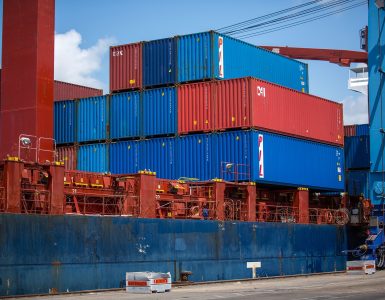When you play politics with international trade, you play a very dangerous game that can result in vast collateral damage. — Jeffrey Tucker, American Institute of Economic Research
Food, beer, gas, cars.
That’s the short list of goods that would rise in price this year if President Donald Trump follows through with new tariffs as high as 25 percent on Arizona’s top trading partner, Mexico, according to industry leaders and economists.
In a tweet last week, Trump announced new punitive trade duties on all imported goods from Mexico to America – that amount to about $350 billion a year. There’s one catch. If Mexico can stop or slow the stream of migrant caravans to U.S. borders, the tariffs will end. If not, trade taxes will rise 5 percent every month until they reach 25 percent.
In an unsettling turnabout, Trump’s news came just days after he had removed metal tariffs on Mexico and Canada and within a day of both countries moving to ratify a free trade agreement, the United States Mexico Canada Agreement (USMCA).
Arizona has much to lose
In a twitter flurry over the weekend, Trump defended his move, saying America will benefit. But the news was a blow to many industries, weary from a year of tariff wars initiated by the U.S. on China, Canada and Mexico. All three countries retaliated.
For Arizona, new trade duties as high as 25 percent on all Mexican products would likely cause serious harm to the state’s economy, said Glenn Hamer, president and CEO of the Arizona Chamber of Commerce and Industry.
Mexico is Arizona’s No. 1 trading partner times four, according to the Arizona-Mexico Commission. Arizona sold nearly $7.6 billion in exports to Mexico in 2018 and imported $9 billion in goods, U.S. Census Bureau shows.
Hiking duties on goods to force Mexico to act on border security issues is questionable and risky, Hamer said. Mexico is likely to retaliate.
“The idea that tariffs are the solution to slow the surge of migrants is misguided and legally dubious,” Hamer said. “It imperils the credibility of the U.S. that is in heated negotiations with China, the European Union and Japan.”
According to a recent analysis by the U.S. Chamber of Commerce, a 5 percent tariff equates to a $425 million tax on Arizonans; a 25 percent tariff more than $2.2 billion.
Fear new tariff war could derail free trade
Widespread disbelief, even among Republican leaders, reverberated in response to Trump’s announcement.
“I support nearly every one of President Trump’s immigration policies, but this is not one of them,” Chairman of the Senate Finance Committee Chuck Grassley (Iowa-R) said in a statement. “I urge the president to consider other options.”
“Trade policy and border security are separate issues,” Grassley said. “This is a misuse of presidential tariff authority and counter to congressional intent. Following through on this threat would seriously jeopardize passage of USMCA.”
U.S. Chamber exploring legal options
The U.S. Chamber of Commerce, the largest business advocacy group in the world, said it would explore legal action if necessary to prevent the move.
“Imposing tariffs on goods from Mexico is exactly the wrong move,” Neil Bradley, executive vice president of the Chamber said on national newscasts. “These tariffs will be paid by American families and businesses without doing a thing to solve the very real problems at the border. Instead, Congress and the president need to work together to address the serious problems at the border.”
Mexican president willing to deal
Mexican President Andrés Manuel López Obrador sent a harsh response to the White House but also indicated this is a matter that can be “rectified.” He dispatched his foreign secretary to the White House to enter into discussions.
“Mexico is doing everything it can to curb the flow of migrants into the states without violating human rights,” he stated in the letter.
The USMCA is likely safe and Mexico is continuing to move toward ratification, said Guillermo Malpica, the head of Mexico’s Trade and NAFTA Office, and willing to discuss more ways to stop illegal migration.
But if the tariffs are kicked in, that could be “problematic” for passage of the USMCA, Malpica said.
America will pay a price
If negotiations fail, American companies and consumers will feel a financial squeeze, leading economists said.
Automakers would be among the sectors hardest hit. If the tariffs were fully implemented to 25 percent, it would “cripple” U.S. automakers and raise the average price of new cars by $1,300, according to a study by Deutsche Bank.
Products that would be affected
Here is a list of the main U.S. imports from Mexico that would be affected, according to the Office of the U.S. Trade Representative:
Auto $93.3 billion
Computer and computing equipment $26.8 billion
Other electrical/electronics $17.2 billion
Crude/mineral/oils $15.8 billion
Precision equipment $15.1 billion
Vegetables $15 billion
Wire/cables/conductors $11.7 billion
Furniture $11 billion
Routers $10.3 billion
Engines/jets $10.1 billion
TVs/monitors $9.4 billion
















Add comment